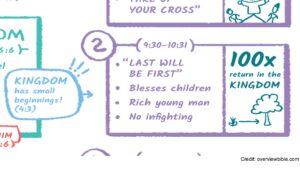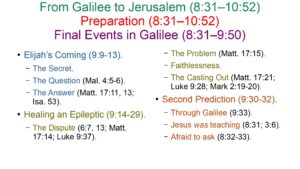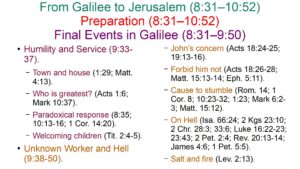Jesus from Galilee to Jerusalem
Mark 8:31–10:52
Preparation
First Prediction of Death and Resurrection (8:31).
The Kingdom is Near (1:15; 9:1)
Final Events in Galilee (8:31–9:50).
Call for Commitment (8:31–9:1).
Transfiguration (9:2-8).
Elijah’s Coming (9:9-13).
Healing an Epileptic (9:14-29).
 Second Prediction of Death and Resurrection (9:31)
Second Prediction of Death and Resurrection (9:31)
Kingdom Has Small Beginnings (4:3-32; 10:29-31)
Second Prediction (9:30-32).
Through Galilee.
Jesus then moves from this location through Galilee.
He travels from Caesarea Philippi or a village around Mt. Tabor.
It was clear His intention was to go through the region unnoticed.
 Mt. Tabor was not far from Nazareth, so He would have healed the epileptic near there garnering further attention.
Mt. Tabor was not far from Nazareth, so He would have healed the epileptic near there garnering further attention.If He were in Caesarea Philippi north of Galilee, then it might have been easier traveling through Galilee unnoticed.
After all, He had gained such popularity in Galilee that traveling through unnoticed would be difficult.
In Mark 9:33, they arrive at Capernaum, which would be backtracking quite a bit if they had been around Mt. Tabor.
He had His eyes set on Judea and Jerusalem, as is evidenced by His second prediction.
Here we see the reason He wanted to pass through unnoticed—He wanted to teach His disciples about what was about to happen.
All the while passing through Galilee, we was teaching and saying what we read in vs. 31.
These verbs are in the imperfect tense, which indicate a continued action in the past—Jesus was teaching, continued to teach, kept on teaching these things.
He was teaching about His death and subsequent resurrection three days later.
What He adds to this teaching that wasn’t in 8:31 was that He was going to be betrayed.
 Really, it says He is being betrayed, present tense, indicating an on-going event.
Really, it says He is being betrayed, present tense, indicating an on-going event.The Greek word for “betrayed” has a more basic meaning, to be delivered up.
Judas Iscariot no doubt heard this—what do you suppose is going through his mind?
One commentator suggests that this is a reference to the Father, that the Father was going to deliver Him up to be killed. He also states that Jesus is also the one who delivers Himself up.
While those are interesting ways to look at it, we do know that Judas will betray Him, so that sense of the word is indicated.
This is an on-going thing, which may mean Judas has already been thinking about this, or that the Pharisees themselves were plotting His death—we certainly know that they were plotting with the Herodians (3:6).
Afraid to ask.
The disciples were still unsure what to make of these predictions.
After Jesus rebuked Peter the last time (8:32-33), they finally learn (esp. Peter) that perhaps silence is the best response.
 Humility and Service (9:33-37).
Humility and Service (9:33-37).Location—town and house.
They return to Capernaum. If the Transfiguration were on Mt. Hermon, then it makes sense they would go back through in order to head toward Jerusalem.
If the Transfiguration were on Mt. Tabor, they would have to backtrack to get to Capernaum, but since this is where Jesus’ headquarters were, it’s not inconceivable that He would want to return there to wrap some things up on His way to Jerusalem.
Also, since we note in 9:30 that they were passing through Galilee, they would have had to pass through more of it if they were at Mt. Tabor.
They had entered into the house, likely the house where He was based which was probably Peter’s house (1:29; Matt. 4:13).
The dispute—who is greatest?
Then Jesus asks then a question—what were you arguing about?
Have you ever been in a situation, say in school, where you and your friends were talking about something, and the teacher interrupts and says, “Billy, why don’t you share with the class?” – that shuts you up pretty quick, doesn’t it!
That’s just the kind of thing that happened here—the disciples likely knew that Jesus would not have approved of this particular discussion so they kept silent.
This must have been in between moments when Jesus was talking about His death and resurrection.
As we discussed before, the reason for asking questions could be to get information, but it could also be used to teach.
Jesus already knew what they were talking about. He knew it either because He’s Jesus and can read men’s hearts, or because the disciples weren’t as quiet as they thought they were and He overheard.
In any event, the dispute was about who would be the greatest.
This is an understandable question given what they thought they knew about the kingdom—Jesus had been predicting His death, which they translated in their minds that He was about to restore the kingdom to Israel (Acts 1:6).
They wanted to know what their positions would be and who would be greatest—the obvious favorites would be Peter, James, and John, but then which of those three?
They were already afraid to ask Him about His teaching (9:32), but they were not afraid to talk about it amongst themselves.
This would not be the last time Jesus talks about this topic, as we’ll see the question the sons of Zebedee have of Jesus later on (10:37).
The paradoxical response.
He sat down as a teacher did in those days, with His disciples around Him.
Jesus utters another paradox—that the last shall be first.
Recall His earlier paradox, that those who desire to save their life will lose it (8:35).
While that was a paradox on commitment, this is a paradox on service and greatness.
As Jesus is portrayed throughout Mark as a servant, He is providing His disciples with an example of the kind of service they also ought to practice.
In doing so, He brings a child in their midst as an object lesson.
Who is this child, and why is there a child nearby? Well, he/she likely lives there and is probably Peter’s kid, or maybe his nephew/niece since Andrew is said to live there, too.
Even though the English says “him,” the Greek is less clear. When referring to children, Greek often uses the neuter gender which is the case here for “child” and any pronouns referring back to the child.
This will not be the last time Jesus refers to little children (10:13-16).
We see here the humility of a child, which is a trait we should emulate (1 Cor. 14:20).
Such humble ones are to be received with open arms. To have a better idea of what that means, other translations say, “welcomes” instead of “receives.” When we do that, we receive Jesus, and in turn, we receive the Father as well!
Welcoming children.
Do any of us scowl when we hear a baby cry out during worship? I agree that as the child ages, he or she needs to be taught how to act in worship, but many times it cannot be helped. There is a balance, however. We come to worship, but it’s hard to do with certain distractions. So what is the best way to handle that situation?
Let me start out by saying that I am opposed to a divided assembly, such as a “children’s church” situation. There is no example of that in Scripture, and article after article has been written attributing it to one main reason why the church has lost so many Millennials. While the learning curve may be steep for some, it’s not impossible. So how best do we deal with that learning curve for new members or visitors?
Always offer the nursery to new or visiting families, “if you should need it, here it is.” Make sure the speaker is working in there. It’s not ideal for the parent back there, but it is better than nothing.
Encourage parents on how to keep there children quiet and still, following the instruction in Titus 2:4-5.
Also, if a parent appears to be having difficulty, be the solution. Ladies, if you can, offer to take the child back to the nursery. Depending on the age, perhaps you can sit with them to help keep the child in line or offer to take the child to sit with you.
These teachings will soon be put to the test …



